MARKETING
The 17 Best Marketing Automation Tools Available to You

A majority of businesses use marketing automation tools nowadays — in fact, studies cite around 56% of businesses currently use the technology, and that number continues to grow.
 While marketing automation software can help companies increase efficiency by streamlining their workflows, there are so many options to choose from, full of different solutions with various features and use cases.
While marketing automation software can help companies increase efficiency by streamlining their workflows, there are so many options to choose from, full of different solutions with various features and use cases.
In this article, we’ll cover:
What are marketing automation tools?
Marketing automation tools use software to automate repetitive marketing tasks. Some platforms only offer email actions, drip sequences, and CRM updates. Others may help with lead scoring, sales lead rotation, SMS, and more.
Automating your marketing tasks can benefit your business by increasing overall efficiency and allowing you more time to work on high-level projects. For example, you can use marketing automation tools to collect valuable data that can be used to create more personalized marketing campaigns and increase conversion rates.
How to Choose the Best Marketing Automation Software
A more niche marketing automation product may be better for SMB and B2C environments, but B2B and enterprise companies may need a platform with wider capability. Here are some key areas to consider as you evaluate marketing automation software products to choose the one that’s right for you:
1. Determine Your Budget and Business Needs
If automation’s benefit can be summed up with one statement, it’s this: It will make you more efficient so you can focus on the tasks you enjoy and that have the highest return. With that in mind, you’ll want to evaluate price as you consider capability.
For SMBs and B2C organizations focusing primarily on email, a scaled-down system might be sufficient. However, with more advanced needs, enterprise (and thus higher ticket) software is more cost-efficient in the long run.
Be sure to choose a provider that’s reasonably priced but can also grow with you as your needs change. After all, reducing bloated operations is critical to scaling effectively.
2. Evaluate the Software’s Ease of Use
Automation isn’t a simple thing to implement, so make sure the interface of the software will work with you, not against you. See if you can find screenshots of the UX so you can determine if it looks simple and easy to navigate.
Automation can be technical, so look for providers that have robust knowledge bases, tutorials, and other customer support options.
3. Explore Analytics and Reporting Options
You’ll want to be able to measure the success of any drip campaigns you have running, so make sure your automation software will keep track of the metrics that matter most to you.
In B2B and enterprise environments with many stakeholders, you may also need advanced reporting abilities such as personalized dashboards or automatic reporting via email.
4. Research Integrations
How well does the marketing automation software play with your existing stack? Integrations allow you to manage data and get more from your tools.
Pro-tip: You can find our essential apps for marketers in HubSpot’s App Marketplace.
5. Consider Potential Limitations
Some automation software platforms may limit the number of actions in a month or the database size you’re allowed.
Going into any evaluation, know how many contacts you have, how many emails you send on average, and what you want the software to accomplish. This will prevent you from underestimating the cost of your automation software.
6. Request a Demo
Before making a final decision, consider reaching out to each provider’s sales team to request a demo or sign up for free trial offers. Trying out a marketing automation tool before you buy it can help you determine which features best serve your needs.
Here, we’ve cultivated a list of marketing automation tools examples to help you sort through your options and feel confident choosing the best solution for you and your team.
Marketing Automation Software Options to Consider
- HubSpot Marketing Automation
- ManyChat
- SendPulse
- Moosend
- Snov.io
- Omnisend
- EngageBay
- Ontraport
- SendinBlue
- ActiveCampaign
- Salesforce Marketing Cloud Account Engagement
- Keap
- Ortto
- Marketo
- GetResponse
- Drip
- Mautic
1. HubSpot Marketing Automation
HubSpot’s marketing automation functionality is one of the most powerful tools on this list in terms of features. It’s also one of the most popular in terms of customer sentiment, according to the G2 Grid for Marketing Automation.
Of course, HubSpot has a full growth suite that includes sales software, marketing software, and support software, which all integrate automatically with HubSpot’s CRM.
The combined effect of having all of your data and growth activity in one place can unleash tons of creative automation possibilities that would be difficult or impossible if you use separate tools.
As a standalone, HubSpot’s marketing automation functionality includes an easy-to-use visual board where you can craft simple or highly sophisticated conditional workflows.
It can take time to master the tool (you’ll scale up more quickly with the help of HubSpot Academy), but once you get a grasp on it, the creative possibilities are endless.
You can set up simple email list autoresponders, or build a smart and complex network of rules designed to target specific users with the exact right email, live chat, website experience, and more.
Basically, HubSpot’s automation tools go far beyond email, so you can scale your growth and spend less time on repetitive tasks.
Price: HubSpot’s email and form marketing automation tools are free. Increased access and features are available in paid versions of Marketing Hub, which start at $45 per month.
2. ManyChat
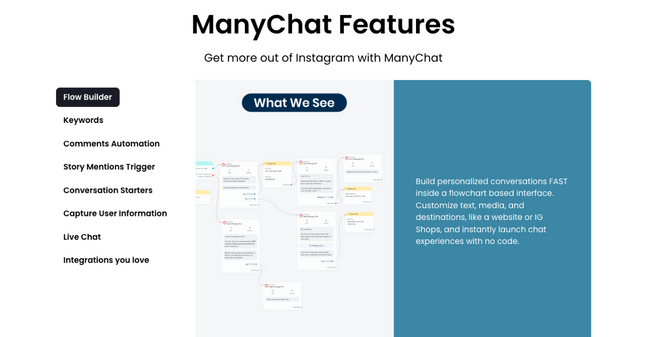
Marketing automation isn’t just about email. Imagine automating some of the most repetitive conversations you have with customers on other platforms. ManyChat functions as a chatbot that can do just that on Facebook Messenger, Instagram Direct Messages, WhatsApp, and SMS.
A bot can be built in minutes with ManyChat’s templates and easy-to-use interface. In addition, the information you learn about your users can be synced to your CRM and other tools.
Price: ManyChat offers a free monthly plan that allows engagement with up to 1,000 contacts via Instagram Direct Messages, Facebook Messenger, and WhatsApp. Additional access and features are available through ManyChat’s paid plans, which start at $15 per month.
3. SendPulse
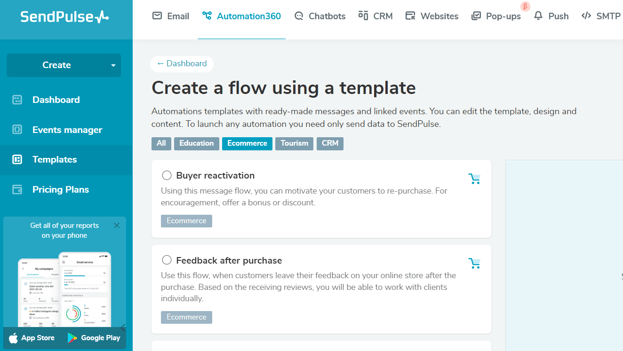
Having started out as an email marketing service, SendPulse gradually evolved into a full-scale marketing automation platform with a variety of channels to reach existing and potential customers.
Established brands and small businesses alike can build highly personalized message flows that combine emails, chatbots, and SMS notifications. The visual chatbot builder itself is very versatile as it allows users to create chatbots for Facebook, Instagram, WhatsApp, Telegram, and Viber. It also supports ChatGPT integration, which will make the chatbot even more human-like.
Price: SendPulse provides a monthly free plan. Paid plans start at around $10 per month.
4. Moosend
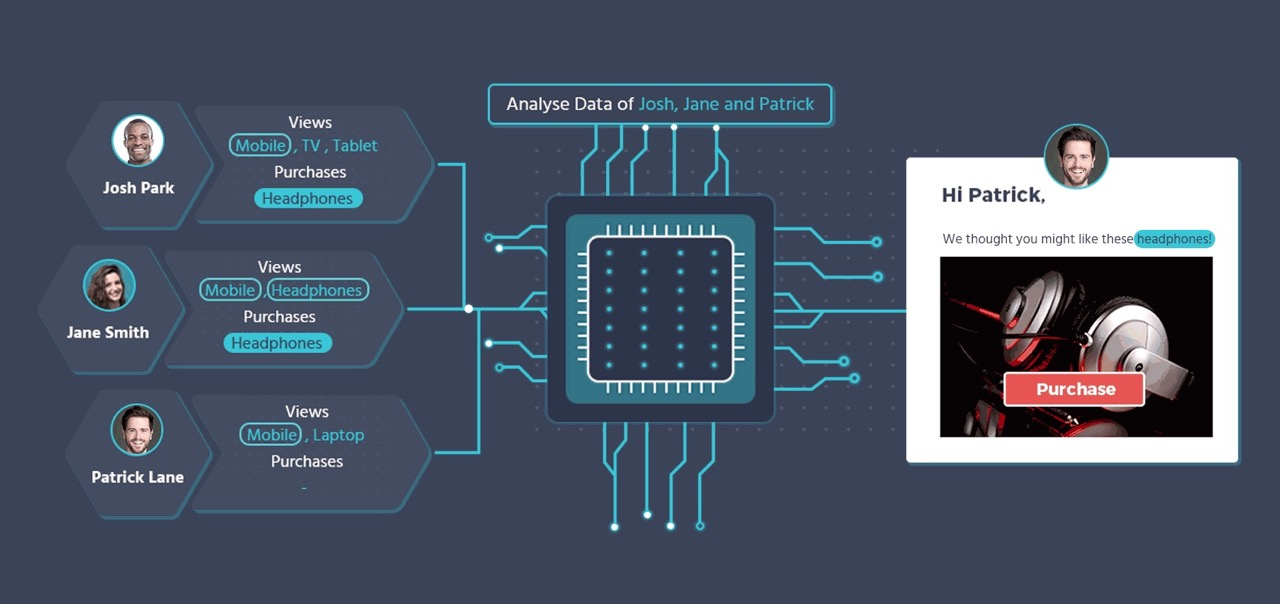
Moosend is an email marketing automation platform that caters to various industries, including ecommerce and SaaS.
The automation feature uses advanced website tracking and triggers that allow you to send the right email campaign to those in your contacts who are interested in a specific product or service. For example, you can set up a cart abandonment series to target potential customers who left their shopping carts without making a purchase.
Collecting and managing customer data can also come in handy as you can use them to craft product recommendation campaigns based on product views. This data also allows you to create detailed reports of the campaign’s progress and the users’ activity so you can optimize the effectiveness of your promotional messages
Price: Moosend offers a 30-day free trial so you can try before you buy. After that, Pro plans start at $9 per month.
5. Snov.io
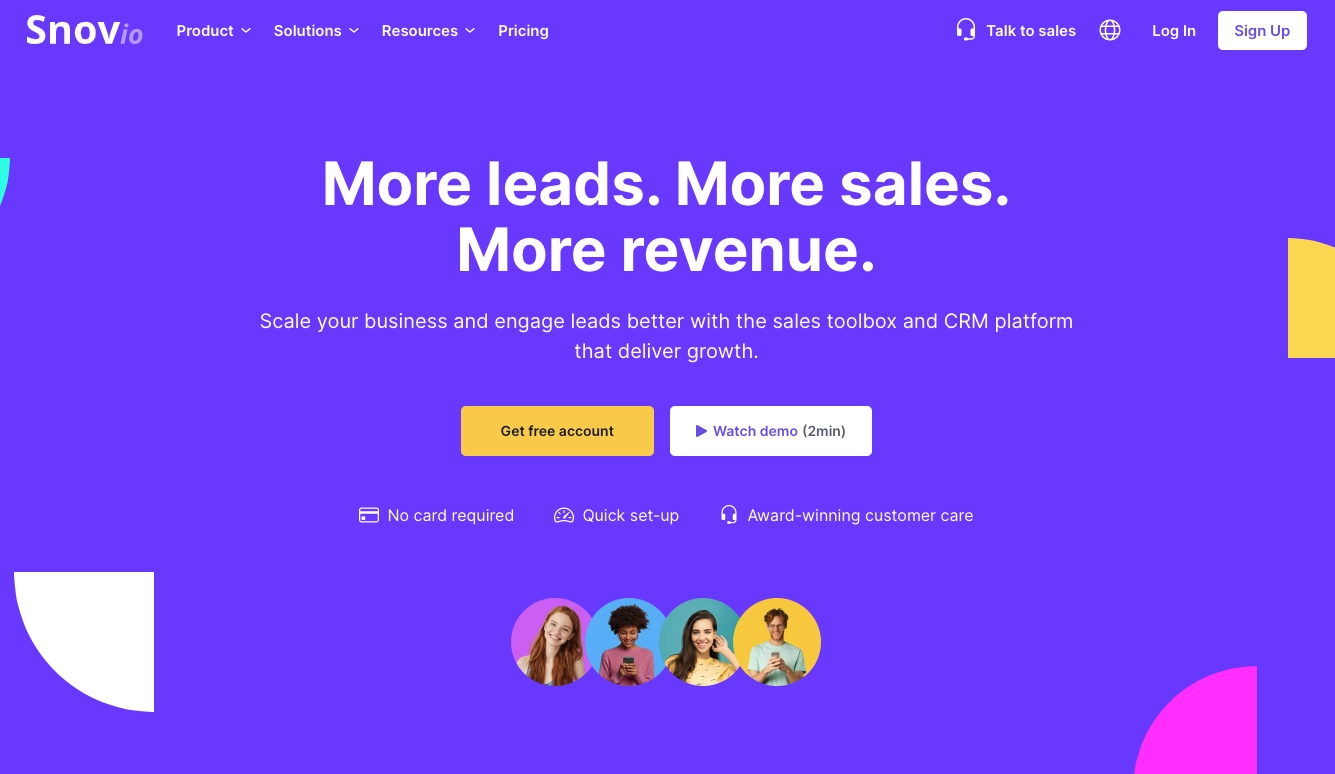
Snov.io is a must-have for businesses and sales teams looking to streamline their lead generation and cold outreach efforts. It’s an all-in-one toolset designed for small businesses and solopreneurs to find, verify, and reach out to leads, with a range of features, including Email Finder, Email Verifier, Email Warm-Up, free CRM, and more.
One of the standout features of Snov.io is its email automation tool, Email Drip Campaigns. You can create highly personalized email campaigns to engage your audience. It also comes with a robust reporting and analytics suite, enabling you to track the performance of your campaigns and optimize your outreach efforts for maximum impact.
Price: Snov.io offers both forever-free and premium plans. The premium plans start at $39 per month.
6. Omnisend
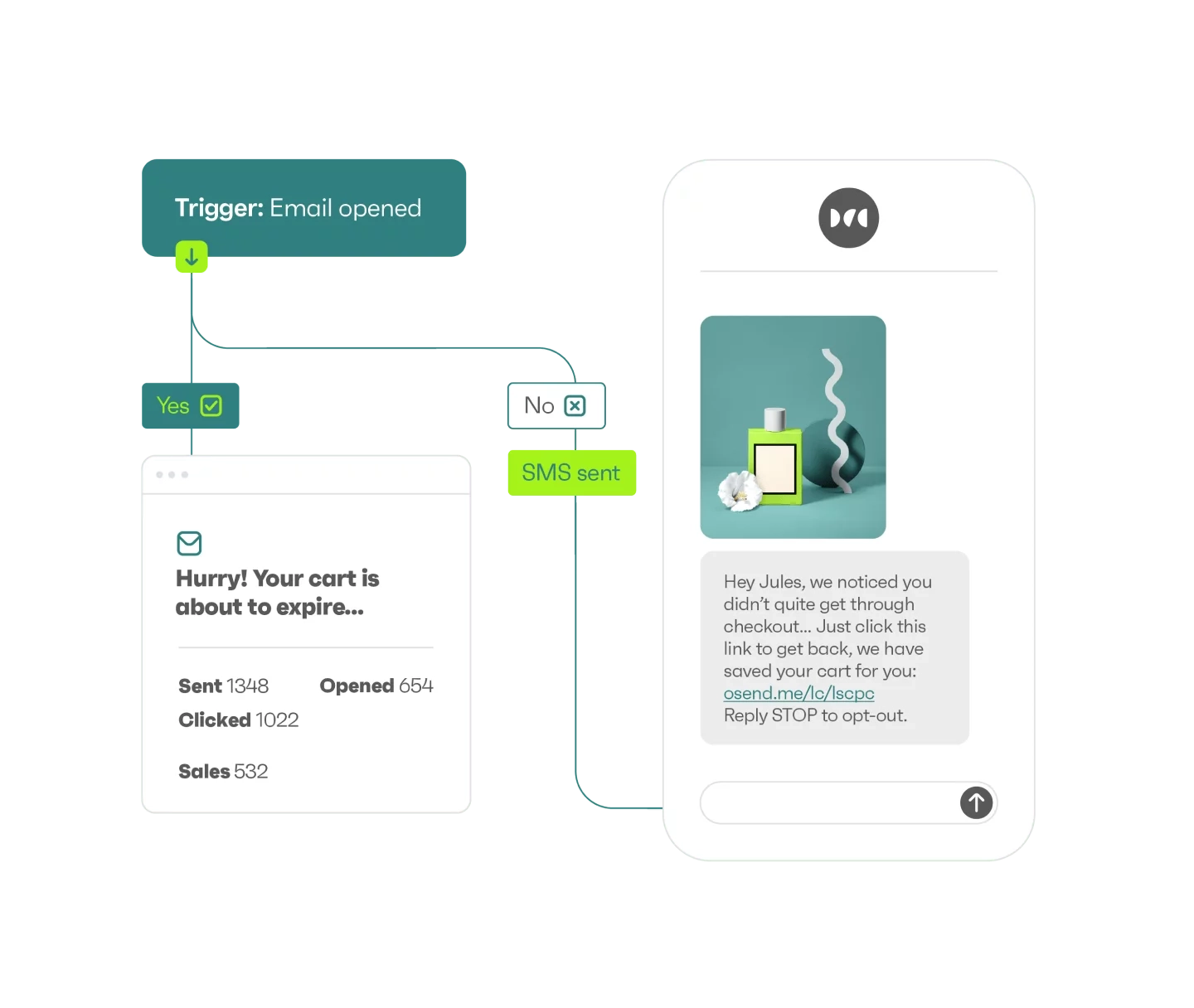
Omnisend is an omnichannel marketing automation platform built for ecommerce. Offering powerful automation workflows, you can get started quickly with pre-built templates that keep online merchants in mind.
With Omnisend, you can add several channels within the same automation workflow: email, SMS, Facebook Messenger, push notifications, and more. Omnisend also uses a user-friendly visual builder and templates which make creating workflows, forms, landing pages, pop ups, and emails quick and easy.
Price: Omnisend offers a free plan with basic email marketing automation that is best suited for small businesses just starting out. Medium to larger-sized businesses will most likely benefit from Omnisend’s paid plans, which start at $16 per month.
7. EngageBay
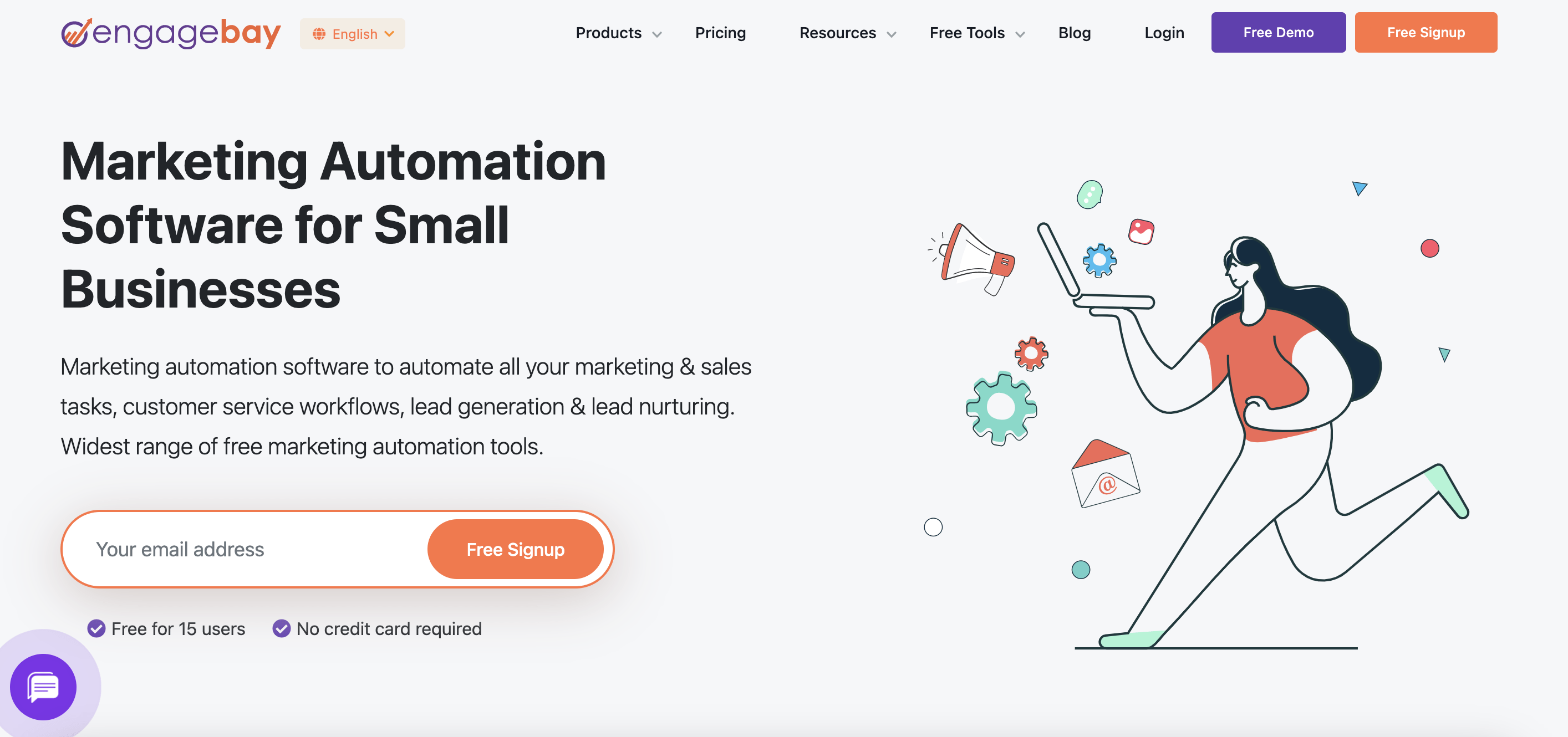
EngageBay is another marketing automation platform designed specifically for small to medium-sized businesses.
This software comes with a wide range of features including email marketing, social media management, and website chat.
Other commendable features include drag-and-drop builders for landing pages and emails, A/B testing, SMS marketing, push notifications, abandoned cart retrieval and reminders, autoresponders, canned responses, and more.
Price: EngageBay offers a free plan for small businesses, as well as three advanced paid plans that scale with your business needs, starting at $10.39 per user per month.
8. Ontraport
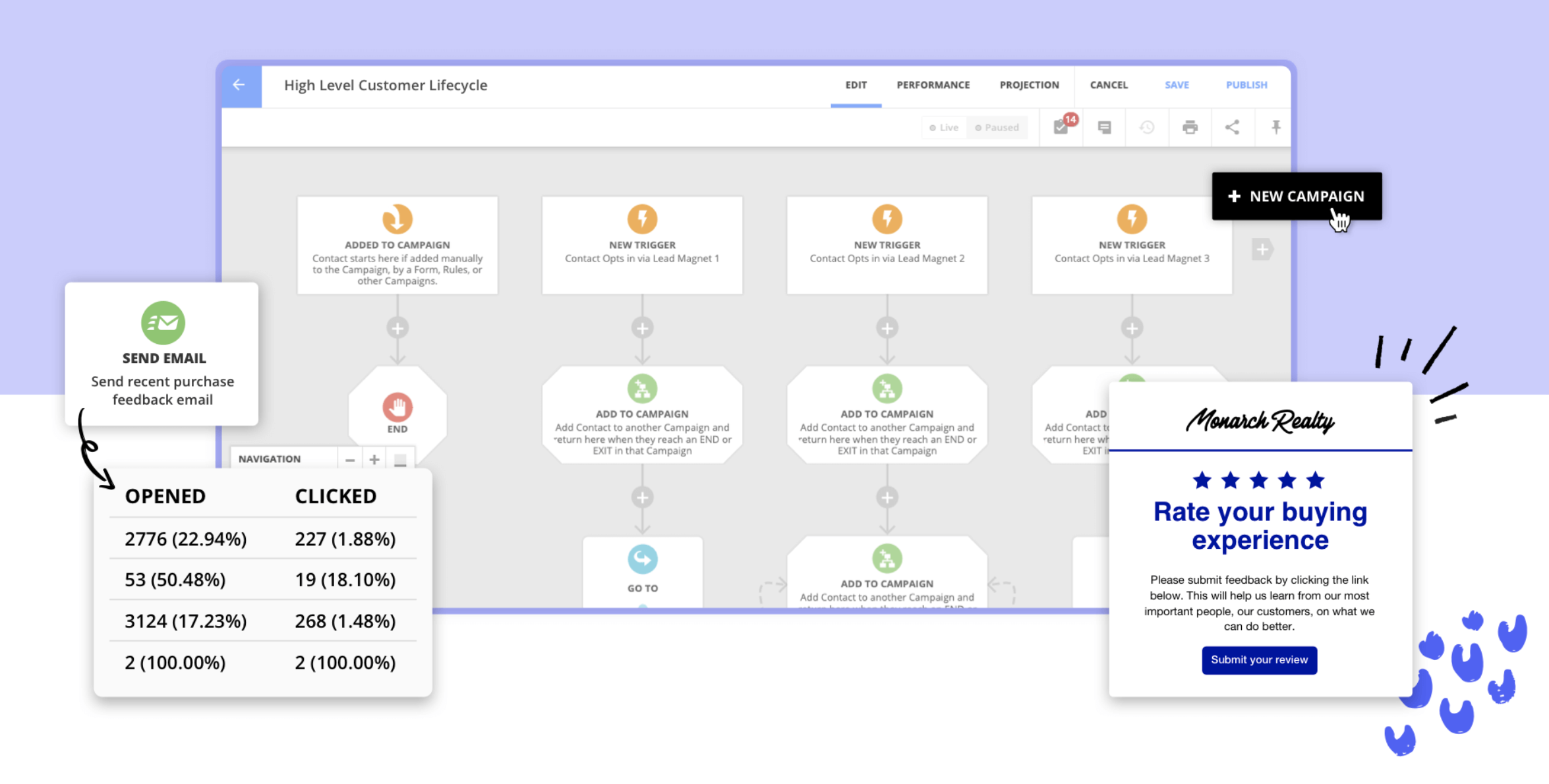
Unlike other marketing automation tools, Ontraport is a business automation software specifically designed for entrepreneurs, solopreneurs, and small businesses.
While it has a CRM and marketing automation functionality, it also has several other features to run and grow a small business, including but not limited to email marketing, landing pages, reporting, and ecommerce.
One of the most valuable things Ontraport offers is its focus on reporting and insights. While some tools can be a bit of a black box, Ontraport gives you a clear look at the performance of your campaigns.
Price: Though Ontraport does not have a free plan, it does offer a free 14-day trial with each of its four paid plans. Pricing for Ontraport’s basic plan starts at $29 per month, which includes unlimited email sending and drag-and-drop marketing automation.
9. SendinBlue
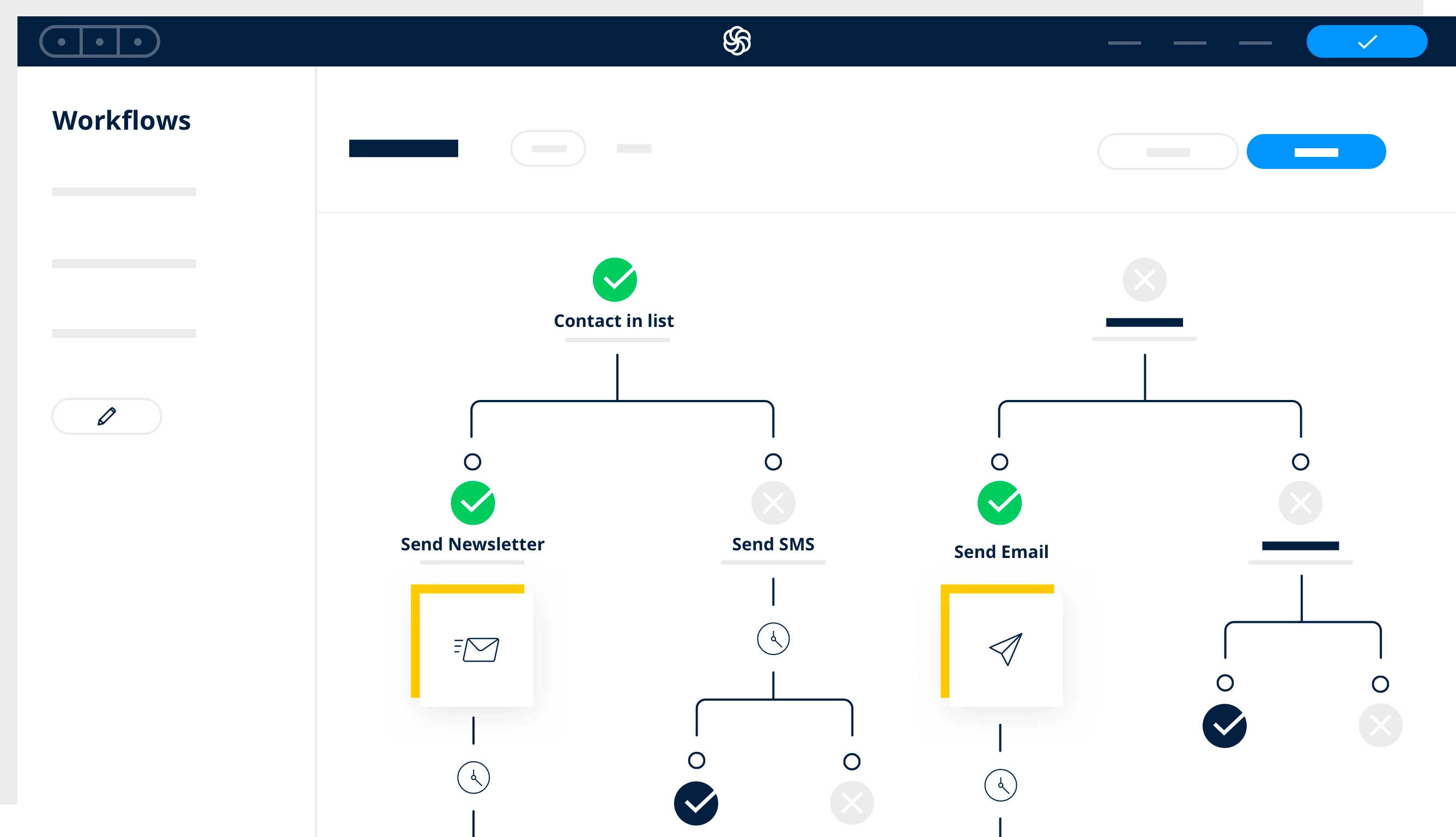
SendinBlue is a digital marketing platform that features well-liked automation software suited for both beginner and advanced marketers.
With SendinBlue, you can design mobile-friendly email campaigns either from scratch or through customizable templates. You can also run SMS campaigns from SendInBlue. Advanced features include reporting and lead scoring.
Price: SendinBlue offers a pretty impressive free plan, which includes basic marketing automation functionality, unlimited contacts, and up to 300 emails per day. Paid plans start at $25 per month.
10. ActiveCampaign
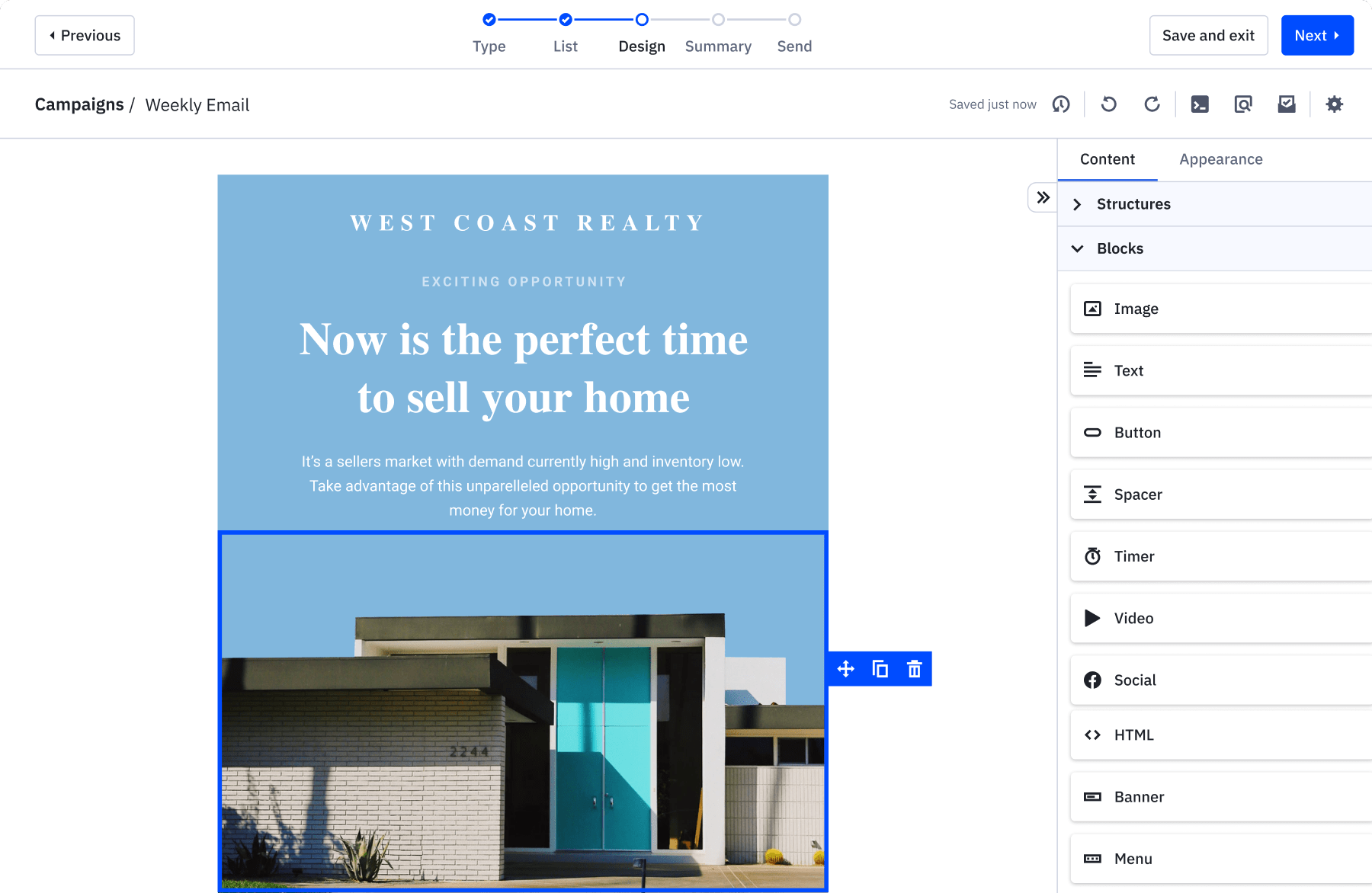
ActiveCampaign is an integrated email marketing, marketing automation, and small business CRM.
The strongest point of ActiveCampaign is its powerful and flexible marketing automation functionality. It’s one of the most comprehensive solutions on the market. Its deliverability is rated as one of the best in the market, as well.
This probably isn’t a good tool for beginners or those with low technical capabilities. It takes a bit more time and effort to learn — but when you do learn the platform, it’s pretty powerful.
Price: Though ActiveCampaign does not have a free plan or trial, it does offer a variety of paid plans that can be suited for B2B, B2C, or ecommerce businesses starting at $29 per month.
11. Salesforce Marketing Cloud Account Engagement
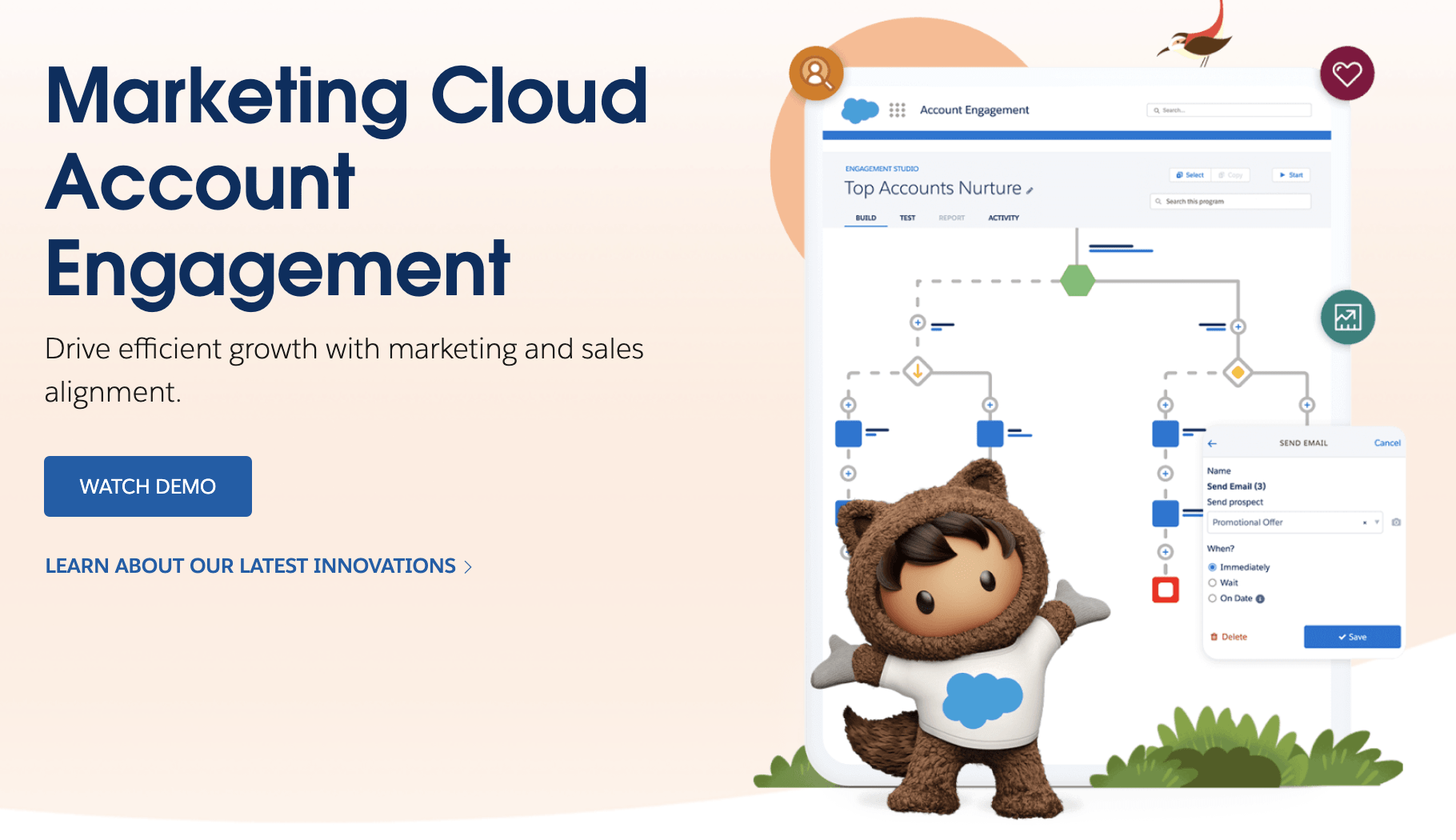
Formerly known as Pardot, Salesforce Marketing Cloud Account Engagement is a cloud automation solution that mostly serves enterprise clients that have the technical resources and time to learn the platform.
It has a ton of features that automate communication to existing contacts, from CRM integration to email marketing, lead nurturing, and an ROI reporting functionality to make sure your campaigns are working.
You can track all interactions on your website and build predictive lead scoring based on the parameters you set. All of this helps improve marketing efficiency and remove wasted time and effort from your sales team.
It’s important to note that while it is incredibly powerful, this software may not be as accessible or affordable for smaller businesses or entrepreneurs as there is not a free plan or trial.
Price: Plans for Marketing Cloud Account Engagement start at $1,250 per month.
12. Keap

Keap (formerly known as Infusionsoft) has been around since 2001 and has helped thousands of marketers deliver on leads, revenue, and customer acquisition targets.
Keap really flourishes in the small business and solopreneur crowd, and in my experience, I’ve noticed it has a pretty sophisticated user base.
You can set up relatively complex decision trees depending on which lead magnet someone signs up for, how many (and which) emails they open and click, or other contact property data.
As Keap’s features continue to evolve, long-time customers may prefer Keap’s Max Classic plan since it is most similar to Infusionsoft’s original platform.
Price: Keap offers a free 14-day trial and three different paid plans based on customer needs, starting as low as $129 per month.
13. Ortto
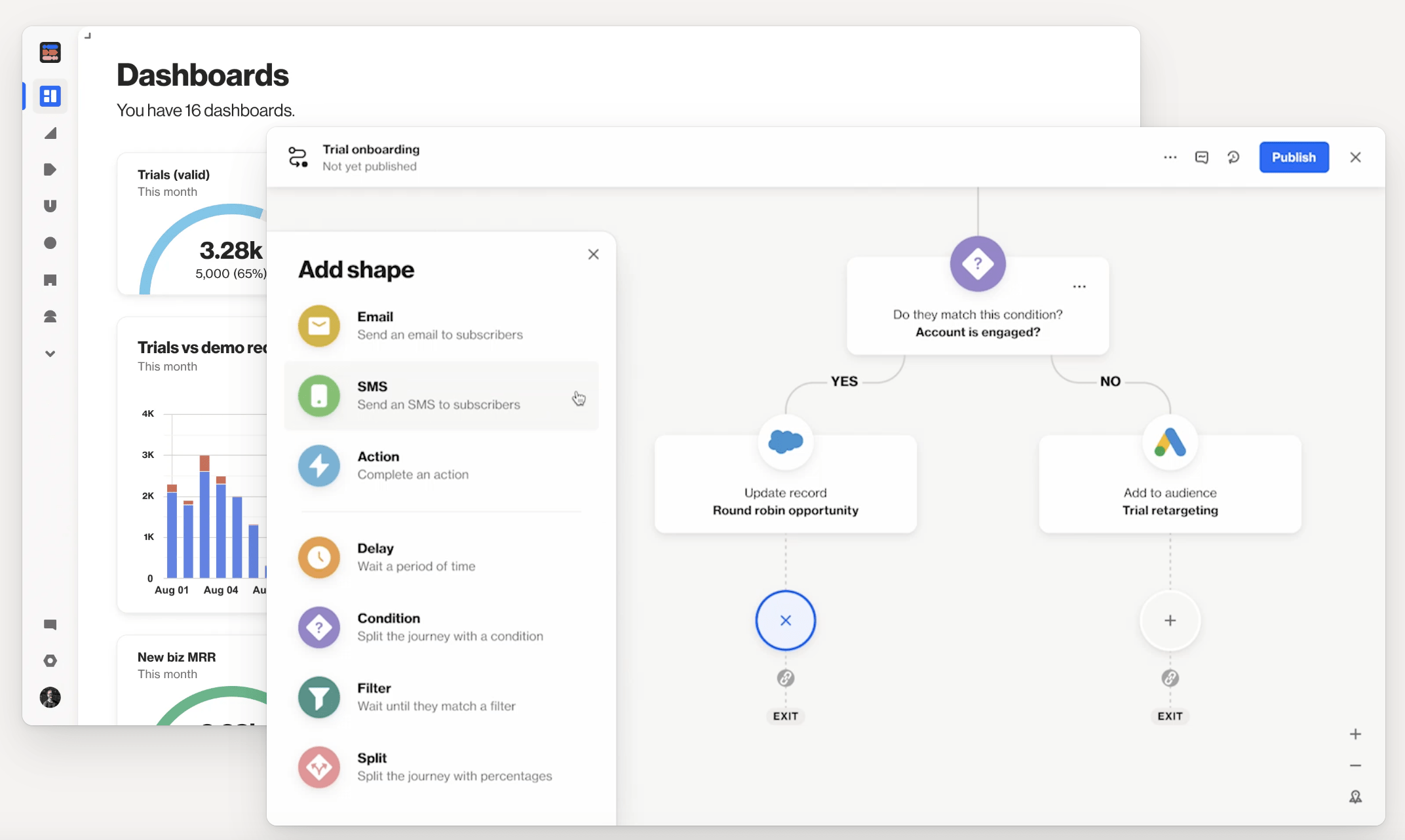
Originally known as Autopilot, Ortto is one of the most visually appealing marketing automation solutions on the market.
Ortto’s automation software allows you to create emails with its easy-to-use, visual campaign builder. Other features include audience segmentation, comprehensive data analytics, and activity tracking.
Of course, this platform is typically used for more sophisticated messaging and targeting, but you can also create a simple autoresponder based on a time sequence.
Price: Ortto offers a free plan for those who are new to marketing automation. It also offers free 14-day trials for all of its paid plans, which start at $29 per month.
14. Marketo
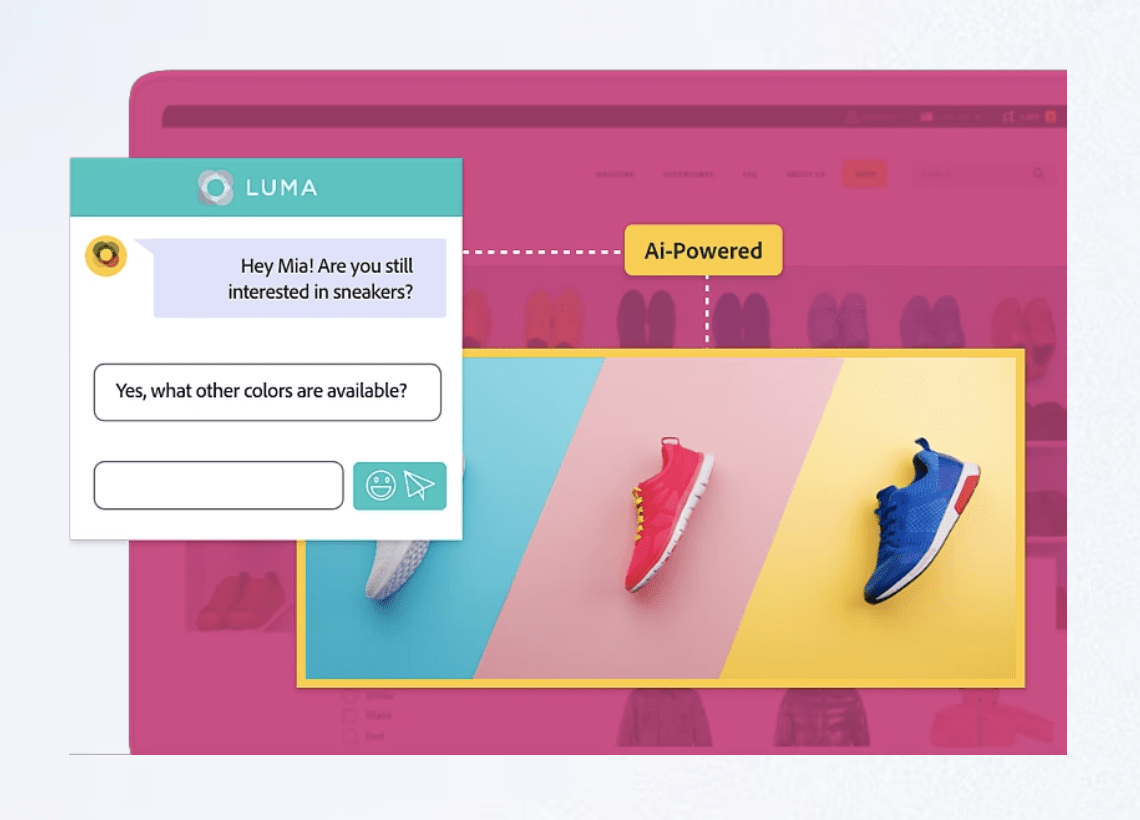
Marketo was founded in 2006 as a marketing automation software company. It was later acquired by Adobe and incorporated into its enterprise marketing cloud.
The Adobe integration means that, if you use Adobe Analytics for data measurement and Adobe Target for experimentation and personalization, you’ll have a powerful enterprise marketing automation and optimization suite.
The tool is typically geared toward enterprise customers — it’s a bit out of range for most small business owners.
Price: Adobe does not offer a free trial or plan for Marketo. Since Marketo’s plan prices are determined by your database size, you will need to reach out to the sales department for a quote.
15. GetResponse
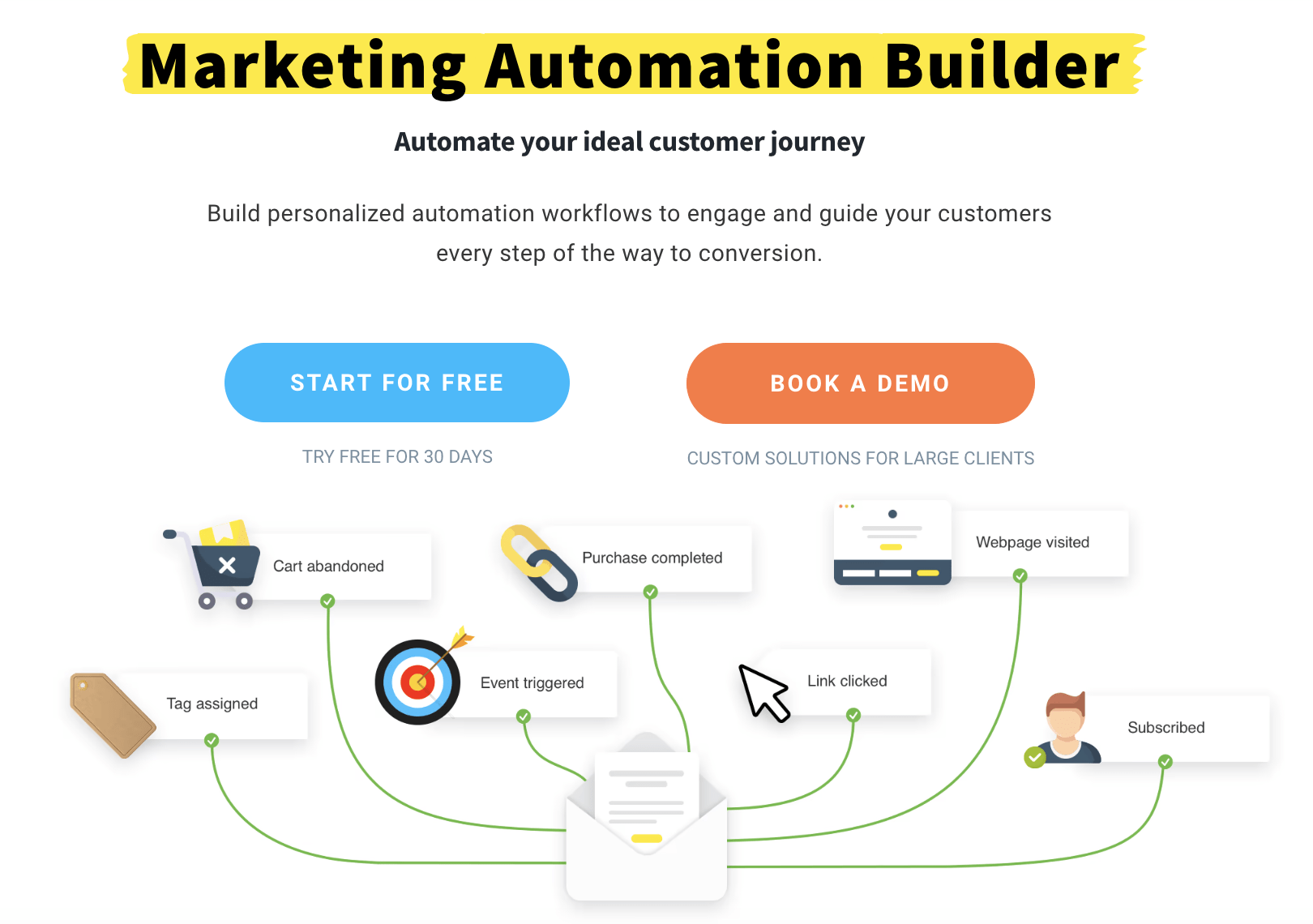
GetResponse is a marketing automation software that has many different layers and features. Its affordable Email Marketing plan includes basic autoresponders, templates, and a list size of 1,000 contacts.
GetReponse’s more premium plans include powerful features like drip campaigns, contact scoring, event-based automation, ecommerce tracking, and more.
In general, this software is easy-to-use. You’ll typically find good results from the tool, although it works best with the simpler features, like email newsletters. It can become trickier to work with the platform if you plan on implementing complicated conditional logic and marketing automation.
Price: GetResponse offers a free plan that’s great for sending out newsletters. However, GetResponse’s marketing automation features are only included in its paid plans, which start at $13.30 per month.
16. Drip
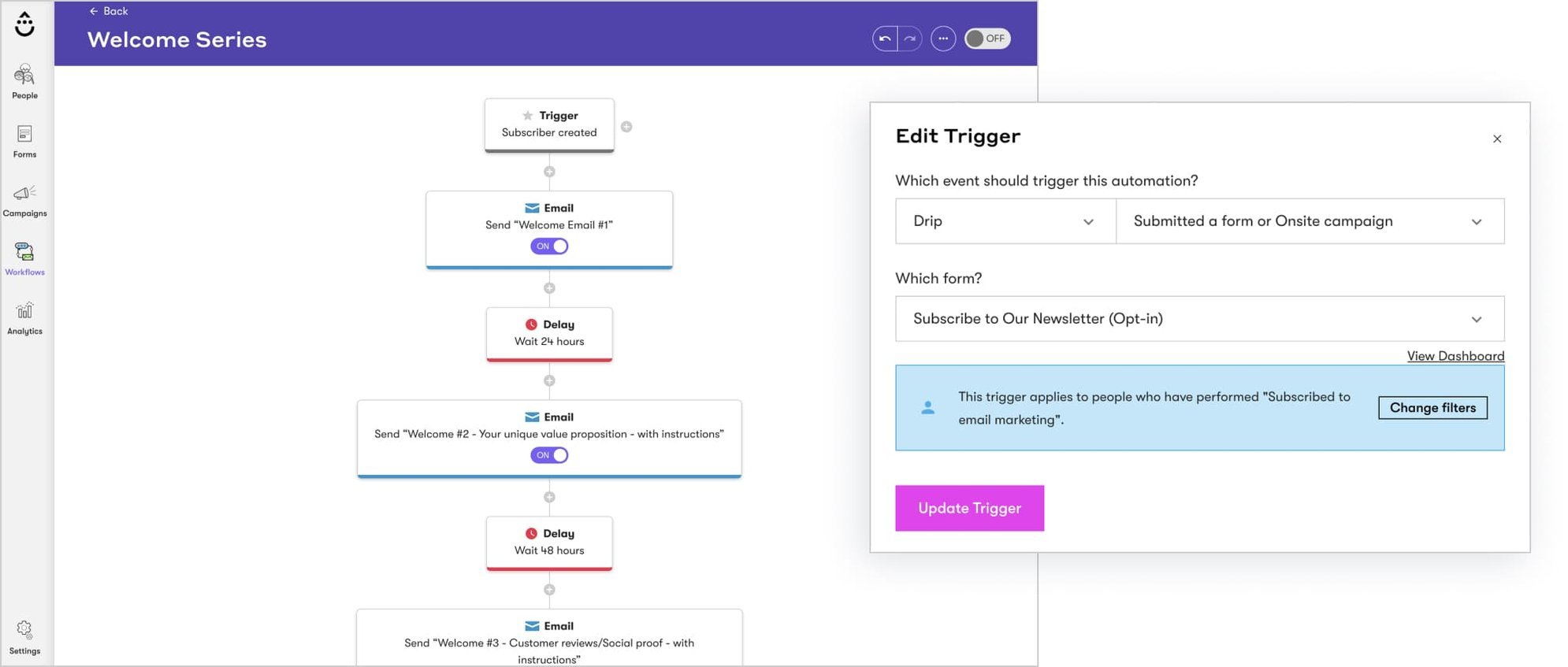
Drip is one of the few marketing automation tools in this list that is primarily focused on ecommerce marketing automation. It provides one of the more “open” platforms, claiming that it plays well with “pretty much any marketing strategy you want to put in motion.”
Additionally, email is one of its strengths. Some email marketing and automation features include unlimited email sends, pre-built workflows, and multi-channel marketing.
It also excels in personalization and analytics. Overall, Drip is a powerful tool for ecommerce marketing automation.
Price: Though Drip does not have a free plan, it does offer a free 14-day trial. Paid plans are based on your number of email contacts and start at $39 per month.
17. Mautic
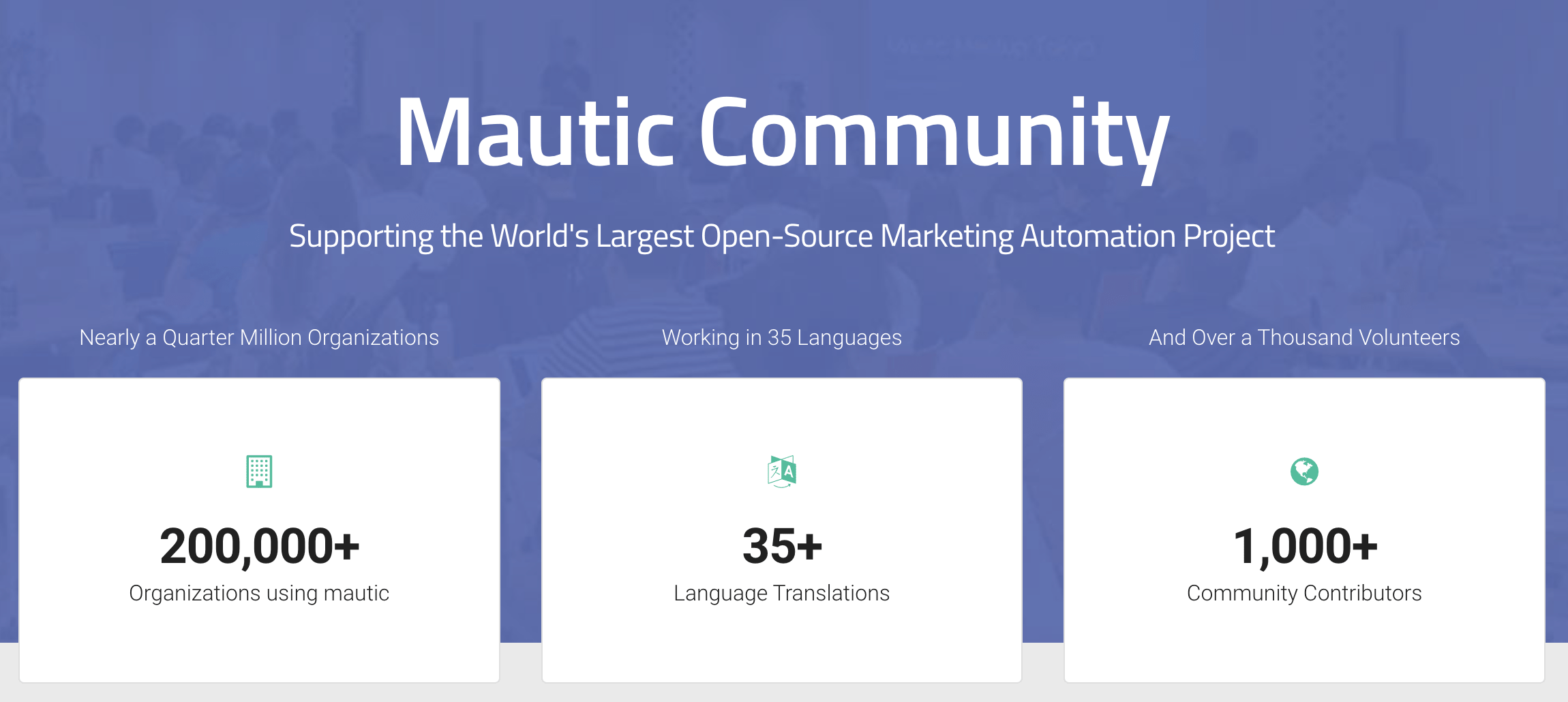
Mautic is the only open-source marketing automation platform on this list. It’s also a relatively new player, only founded in 2014. Mautic has grown quickly, though, and is seemingly picking up steam with high-tech companies.
Currently, over 200,000 organizations use Mautic and it is available in over 35 languages.
Price: Free.
Getting Started with Marketing Automation
There are tons of options for marketing automation software. It’s all about choosing the right one for your business purposes, budget, and technical expertise.
Want something incredibly powerful and limitless? It may end up costing more and taking time and effort to learn. The cheaper options, by comparison, might have too limited a scale. Ultimately, it’s a trade-off.
Editor’s note: This post was originally published in April 2019 and has been updated for comprehensiveness.

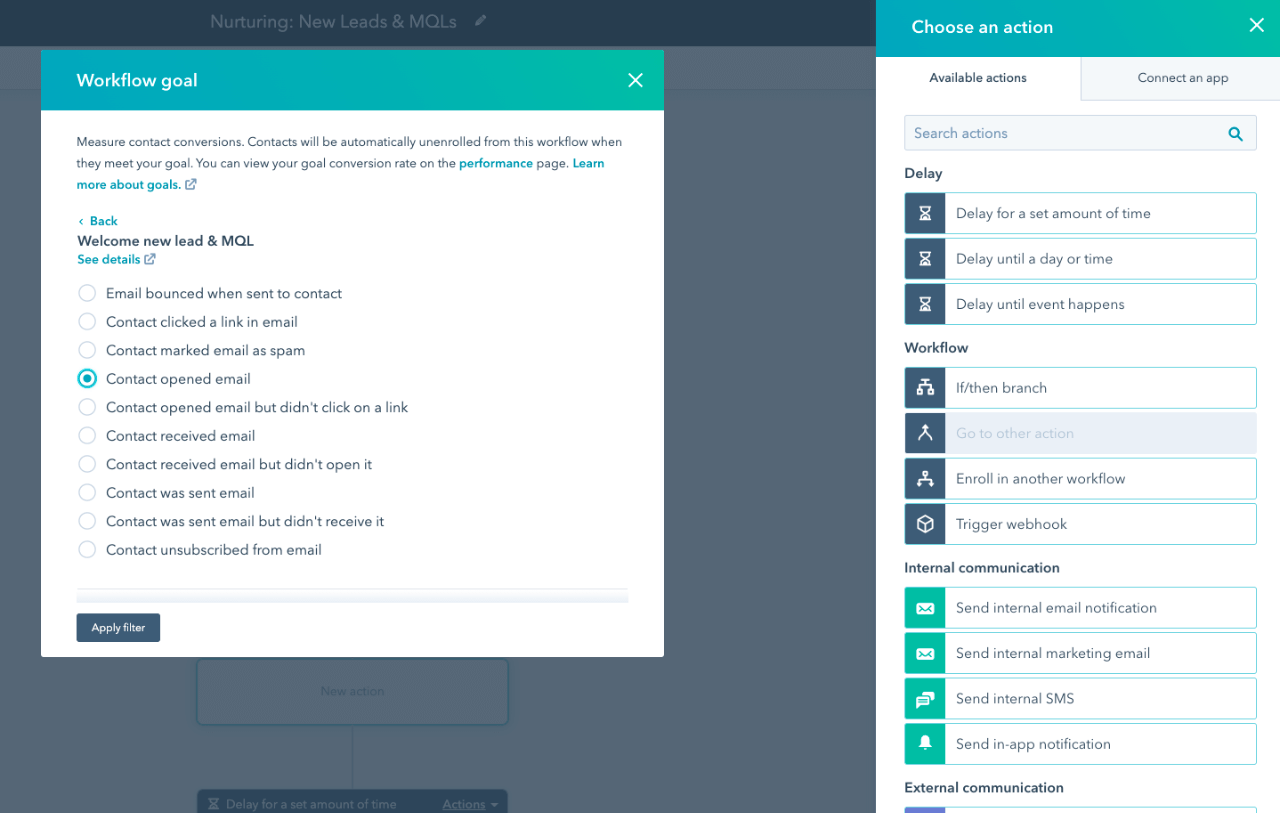
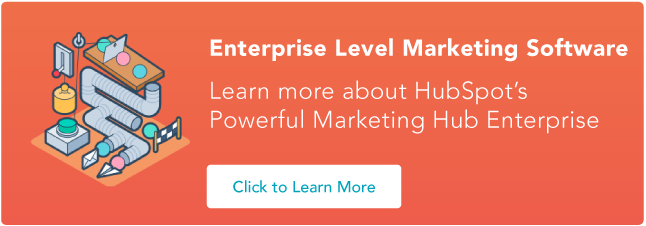




![How AEO Will Impact Your Business's Google Visibility in 2026 Why Your Small Business’s Google Visibility in 2026 Depends on AEO [Webinar]](https://articles.entireweb.com/wp-content/uploads/2026/01/How-AEO-Will-Impact-Your-Businesss-Google-Visibility-in-2026-400x240.png)
![How AEO Will Impact Your Business's Google Visibility in 2026 Why Your Small Business’s Google Visibility in 2026 Depends on AEO [Webinar]](https://articles.entireweb.com/wp-content/uploads/2026/01/How-AEO-Will-Impact-Your-Businesss-Google-Visibility-in-2026-80x80.png)










